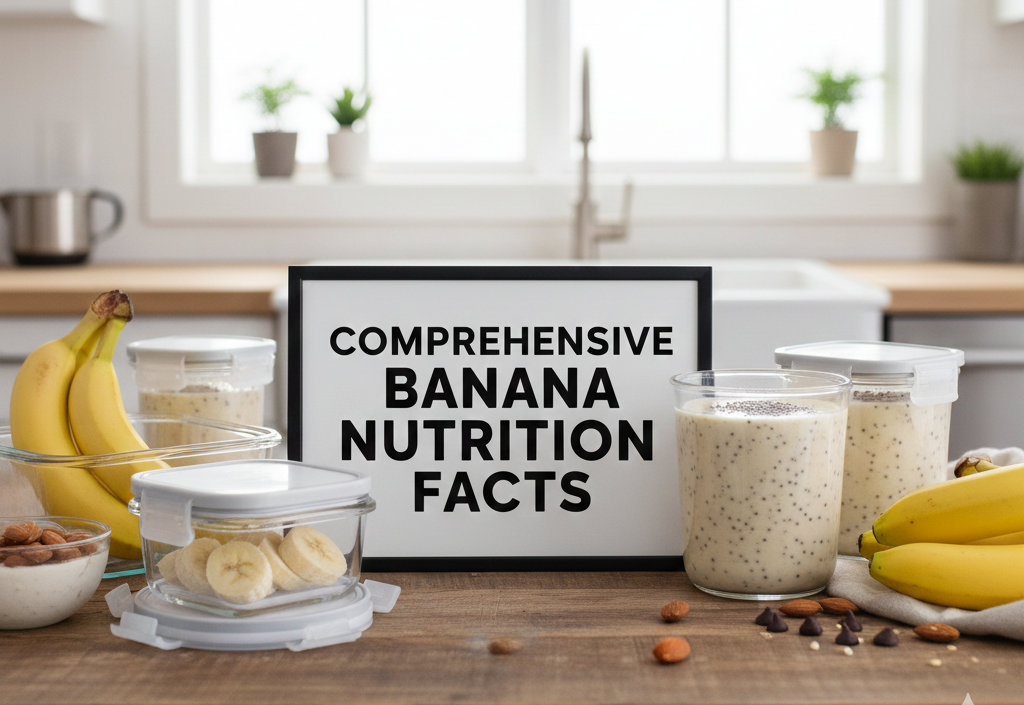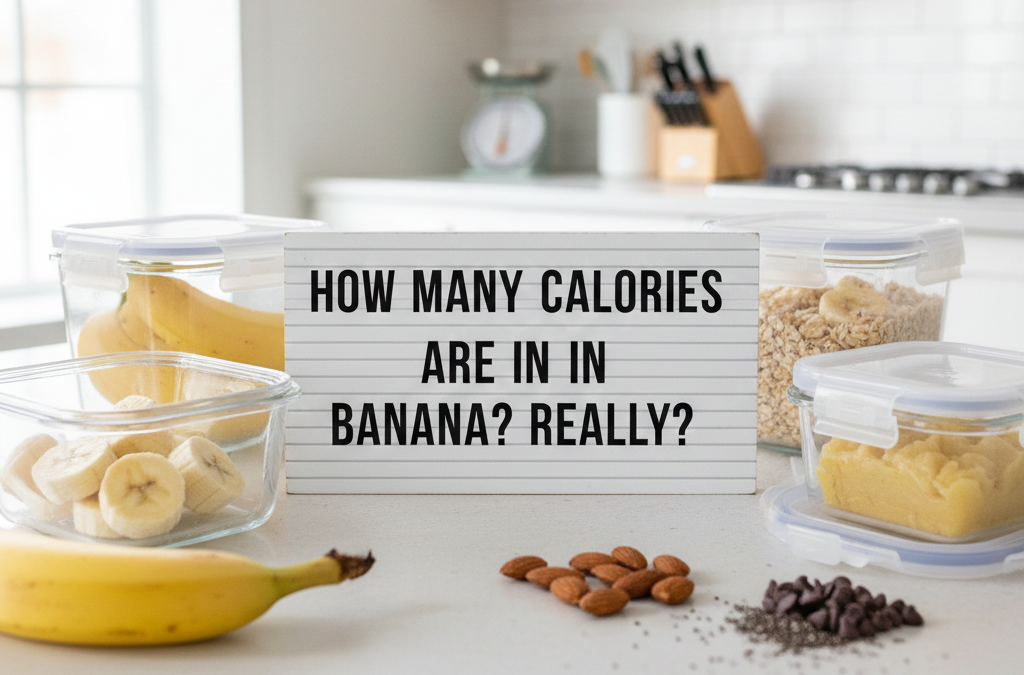How Many Calories Are In a Banana, Really?
The short answer is: it depends on the size!
When people ask how many calories are in a banana, they often expect a single, fixed number. But bananas are not manufactured in a factory—they grow in various shapes and sizes. The most important thing to remember is that the vast majority of calories in a banana come from healthy, natural carbohydrates.
Here’s a quick, easy-to-reference breakdown of the typical calories in banana based on size:
| Banana Size | Approx. Weight (Grams) | Approximate Calories |
|---|---|---|
| Extra Small (under 6 inches) | < 81 g | 70–80 kcal |
| Small (6–7 inches) | 81–100 g | 90–100 kcal |
| Medium (7–8 inches, the most common size) | 100–118 g | 105–110 kcal |
| Large (8–9 inches) | 118–136 g | 120–135 kcal |
| Extra Large (9 inches and up) | > 136 g | 140+ kcal |
So, if you reach for the average, common banana found at the store (the medium one), you’re consuming around 105 calories. That is absolutely a healthy snack choice, especially compared to highly processed alternatives!
Comprehensive Banana Nutrition Facts: What’s Inside?
A banana isn't just about calories; it’s a powerhouse of beneficial nutrients. Understanding the banana nutrition factsreveals why this fruit is celebrated by athletes and dietitians alike.

1. The Macronutrient Breakdown
For a standard medium banana (approx. 110 kcal):
- Carbohydrates: Roughly 27 grams. These are your primary fuel source! When the banana is green/less ripe, the carbs are largely resistant starch (a type of fiber); as it ripens, this converts to natural sugars (glucose, fructose, and sucrose).
- Fiber: Around 3 grams. This is fantastic! This is why bananas are considered high-fiber foods, which is crucial for digestive health and satiety.
- Protein: About 1.3 grams.
- Fat: Less than 0.5 grams.
This profile makes the banana a perfect example of a macro-friendly food—low in fat, moderate in calories, and rich in quality carbohydrates.
2. Micronutrient Highlights
What makes this simple fruit truly shine are the vitamins and minerals packed inside:
- Potassium: Bananas are famously rich in potassium, a mineral and electrolyte that is vital for regulating blood pressure, supporting nerve function, and maintaining fluid balance.
- Vitamin B6: Essential for metabolism, red blood cell formation, and nervous system function. A medium banana can provide about 25% of your recommended daily intake.
- Vitamin C: An important antioxidant that supports immune health and skin collagen production.
- Magnesium: Involved in hundreds of biochemical reactions in your body, from muscle function to energy creation.
More Than Just Fuel: Incredible Banana Benefits
The health banana benefits go far beyond just providing quick energy. Here are a few ways this fruit supports your overall well-being:
1. Digestive Powerhouse
As mentioned, bananas are great sources of dietary fiber. This fiber helps regulate your digestive system, preventing both constipation (by adding bulk) and, surprisingly, soothing an upset stomach. Unripe bananas contain resistant starch, which acts like a prebiotic, feeding the friendly bacteria in your gut.
2. Heart Health Champion
Thanks to their high potassium content, bananas are key players in heart health. Potassium helps counterbalance the effects of sodium, helping to keep blood pressure levels in a healthy range. Adding potassium-rich foods like bananas to your diet can be a simple, effective strategy. To make sure you're consistently hitting your nutrient goals across all your meals, planning is key. If you struggle with structure, a tool like our Weekly Meal Planner can make sure you never miss out on these powerful nutrients.
3. Sustainable Energy for Workouts
Bananas are the ultimate pre- or mid-workout healthy snacks. They provide easily digestible carbohydrates (sugars) that deliver a fast and sustained energy boost, preventing that mid-session slump. The potassium also helps replace electrolytes lost in sweat.

Are Bananas for Weight Loss or Weight Gain?
This is the big debate! Many people fear bananas because of the "sugar" and "carb" content, assuming they will lead to weight gain. This is a common misconception.
A banana is absolutely a banana for weight loss when consumed in moderation and as part of a balanced diet. Here’s why
Satiety is the Secret Weapon
The real magic of bananas for weight management lies in their fiber content. Fiber makes you feel fuller for longer, which reduces the likelihood of overeating or snacking on less healthy, high-calorie foods later in the day. When you feel satisfied, you naturally consume fewer total calories—and a calorie deficit is the only way to achieve fat loss.
Bananas are excellent weight loss foods because they swap out a processed, nutrient-poor snack for a nutrient-dense, filling one.
The Role of Calories and Macros
No single food is inherently "fattening." Weight gain happens when you consistently consume more calories than your body burns. Bananas are moderately caloric, but they offer such high nutritional return that they are usually worth the investment.
If you're actively tracking your intake to ensure fat loss, knowing your exact numbers is crucial. Our Calorie & Macro Calculator can instantly calculate the macros for any food, including your favorite banana varieties, so you can perfectly fit them into your daily goals.
Practical Tips: Including This Healthy Snack in Your Diet
Ready to start making bananas a staple? Here are a few easy, delicious ways to incorporate them into your daily routine:
- The Perfect Pre-Workout: Eat half a banana about 20-30 minutes before hitting the gym or going for a run. It’s light, digests quickly, and gives you the energy you need.
- Frozen Dessert Hack: Peel a ripe banana, slice it, and freeze the slices. Blend the frozen slices in a food processor with a splash of milk or water for an instant, creamy, one-ingredient "nice cream." It's a great substitute for high-calorie ice cream.
- Oatmeal Booster: Mash half a banana into your morning oatmeal while it's cooking. It acts as a natural sweetener, allowing you to skip the added sugar. This also helps you get a double dose of high-fiber foods to start your day strong.
- The Smoothie Staple: A frozen banana adds creaminess and thickness to any smoothie without using ice. Pair it with spinach, protein powder, and nut butter for a truly macro-friendly meal replacement.
Want a foolproof way to ensure a banana is always on hand for that mid-morning slump or pre-gym snack? Incorporating it into a structured plan, like one you build with our Weekly Meal Planner, keeps healthy choices front and center and prevents those panic-grabs for less nutritious options!
Final Peel: Enjoy Your Bananas!
Hopefully, this deep dive has demystified the mighty banana for you. It's a fantastic source of energy, fiber, and essential minerals like potassium, and its moderate calorie count makes it an excellent choice for anyone pursuing a healthier lifestyle or weight loss goal.
So go ahead—enjoy that banana! It's one of the best and most convenient healthy snacks you can choose.
AI-powered nutrition
Get Your Personalized Meal Plan
AI creates the perfect meals for your goals, lifestyle, and taste.
Start Your Journej
